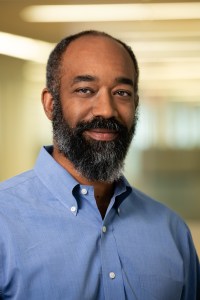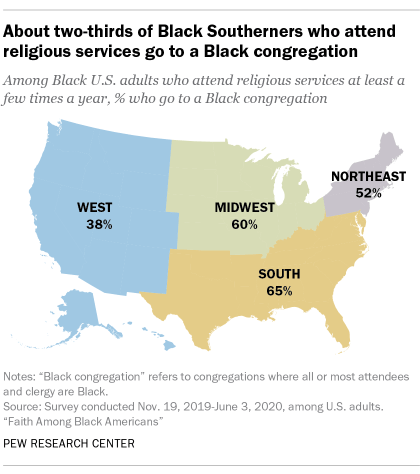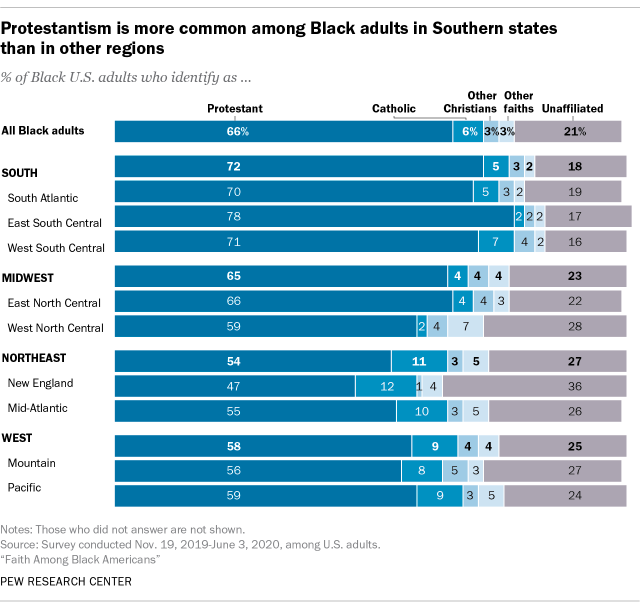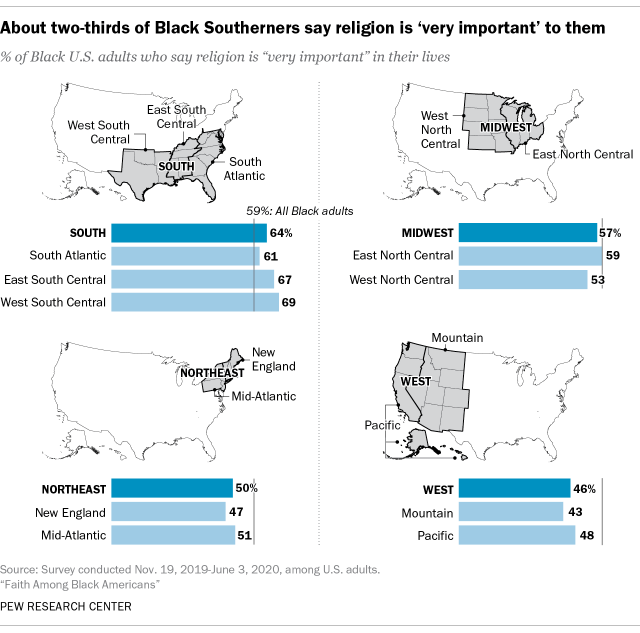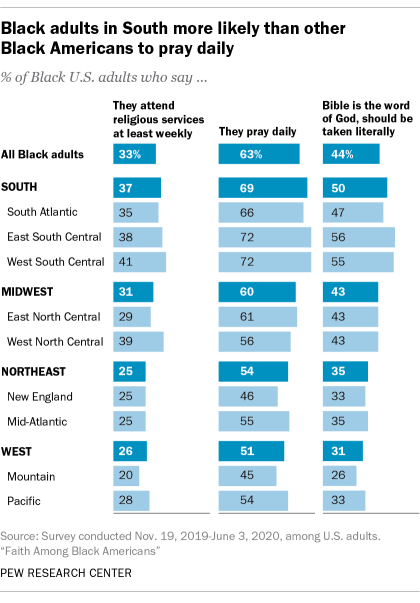Worship habits among Black Christians in the South, where African American churches date back to the 1770s, have long differed from practices of Black Americans in other parts of the United States. Contrasting styles of worship were a source of tension after the Civil War and during mass migrations of Southern Black people to Northern cities, when Black Northerners objected to expressive forms of worship that were common in the South, such as dancing in church.
Today, there are few regional differences among Black Americans when it comes to worship styles, but Black Southerners diverge from other Black Americans – especially Northeasterners and Westerners – in other ways when it comes to religion, according to a recent Pew Research Center report based on a survey of 8,660 Black U.S. adults.
For example, Black Southerners are more likely than Black Americans living elsewhere to be part of a Black congregation (where all or most attendees and clergy are Black). In the Southern U.S., roughly two-thirds of Black adults who attend religious services at least a few times a year (65%) say they worship at a Black congregation. That’s slightly higher than the share of Black adults in the Midwest (60%) who say they go to a Black congregation, and much higher than the shares in the Northeast (52%) and West (38%) who say this.
This post on the regional differences in the religious practices and beliefs of Black adults in the United States draws on Pew Research Center’s landmark study, “Faith Among Black Americans,” published in February 2021. The study was based on a nationally representative survey of 8,660 Black adults (ages 18 and older). The sample consists of a wide range of adults who identify as Black or African American, including some who identify as both Black and Hispanic or Black and another race (such as Black and White, or Black and Asian).
Survey respondents were recruited from four nationally representative sources: Pew Research Center’s American Trends Panel (conducted online), NORC’s AmeriSpeak panel (conducted online or by phone), Ipsos’ KnowledgePanel (conducted online) and a national cross-sectional survey by Pew Research Center (conducted online and by mail). Responses were collected from Nov. 19, 2019, to June 3, 2020, but most respondents completed the survey between Jan. 21 and Feb. 10, 2020. Here are the questions used in this analysis, along with responses, and its methodology.
A closer look at subregional divisions used by the U.S. Census Bureau shows that Black attenders in the South who live in Alabama, Kentucky, Mississippi and Tennessee – known as the East South Central division – are even more likely than other Black attenders in the South to worship at Black congregations (73% vs. 63%).
The religious experience of Black Southerners stands out in other ways, too. Protestantism, which is the most common faith among Black Americans in all four regions of the country, is most prevalent among Black Americans in the South (72%). That compares with 65% of Black adults in the Midwest, 58% in the West and 54% in the Northeast. Black Southerners in the East South Central subregion are even more likely than Black adults in other parts of the South to say they are Protestant (78% vs. 70%).
In contrast, the Northeast has relatively high shares of Black Catholics and adherents of non-Christian religions compared with the South; 11% of Black Northeasterners are Catholic, compared with 5% of Black Southerners.
A similar pattern can be seen when looking at religious service attendance and frequency of prayer: More than a third of Black Southerners (37%) say they attend worship services at least once a week, compared with roughly three-in-ten Black adults in the Midwest (31%) and about a quarter in the West (26%) and Northeast (25%). And about seven-in-ten Black Southerners (69%) say they pray daily, compared with six-in-ten in the Midwest and just over half in the Northeast (54%) and West (51%).
Among Black Southerners specifically, those who live in the East South Central division of the South as well as the area made up of Arkansas, Louisiana, Oklahoma and Texas (West South Central) are more likely than Black Southerners in states along the Atlantic coast and in West Virginia (South Atlantic) to say they pray daily. They are also more likely to say that religion is “very important” to them.
Black Southerners also are more likely than Black people in other regions to say the Bible is the literal word of God. Half of Black Southerners say they believe this, compared with 43% of Black adults in the Midwest, and around a third of Black Northeasterners (35%) and Westerners (31%). Again, Black Southerners on the Atlantic coast and in West Virginia are less likely than those in other parts of the South to say the Bible is the literal word of God.
Some of these regional trends are also present in the general U.S. population. When it comes to the importance of religion, U.S. adults overall in the South (48%) are more likely than Americans in the Midwest (40%), Northeast (34%) or West (35%) to say religion is very important in their life. Within the South, U.S. adults in the East South Central division (55%) are more likely than Americans in the South Atlantic states (45%) to say religion is very important to them.
And, among U.S. adults overall, roughly half of Southerners (52%) and Midwesterners (48%) identify as Protestant, compared with smaller shares in the West (32%) and Northeast (30%). Northeasterners are more likely to be Catholic (29%) than are adults in the Midwest (20%), West (20%) and South (18%).
Note: Here are the questions used in this analysis, along with responses, and its methodology.

